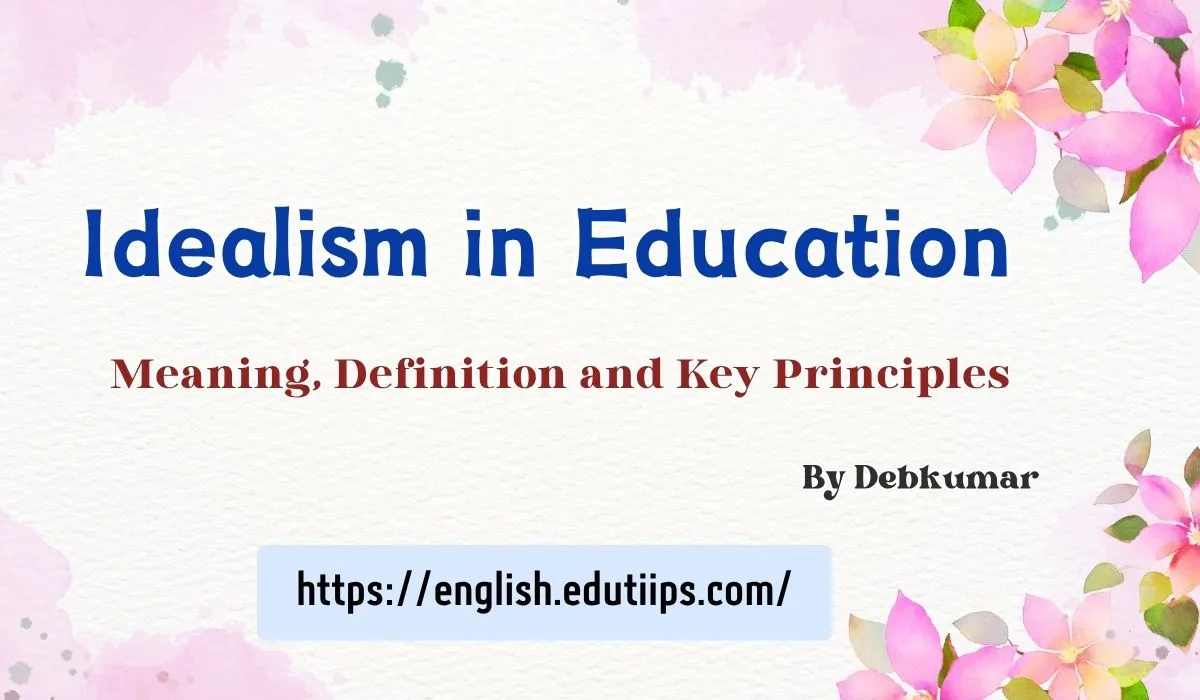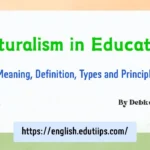Idealism is the most ancient thought in the world of philosophy. Explore the concept and definition of idealism in education and learn the core principles of idealistic philosophy.
Idealism in Education Philosophy emphasizes that human development should be according to moral, ethical and spiritual values through which man acquires knowledge of unity in diversity.
Meaning of Idealism in Education
The words ‘idea’, ‘ideology’ and ‘idealism’ come into the vocabulary of philosophy from the Greek word ideain meaning to see something figuratively. The term idealism is the combination of the words ‘Idea’ and ‘Ism’. The real word is ‘ideaism’ but the letter “I” added to aid in the pronunciation and, hence, it is known as Idealism.
Idealism in education is a philosophy that emphasizes the spiritual and intellectual aspects of human development. It assumes that knowledge acquired through the activity, creativity and exercise of the mind is more important than the knowledge acquired through the senses.
So, Idealism shifts the emphasis from the natural or scientific fact of life to the spiritual aspects of human experience.
Protagonists of Idealism
Idealism is an old philosophy represented by great philosophers such as –
Western philosopher – Plato, Socrates, Descartes, Spinoza, Comenius, Berkley, Fichte, Pestalozzi, Froebel, Kapil, Green,
Indian Philosopher – Mahatma Gandhi, Rabindra Nath Tagore, Swami Vivekananda, Guru Nanak, Dayananda, Aurobindo Ghosh and S. Radhakrishnan.
They have accepted and developed idealistic views and applied them in the field of education.
Definition of Idealism in Education
Idealism is born out of Plato’s Theory of Ideas. According to this doctrine, the ultimate supremacy is of ideas. Idealism emphasises that human development should be according to moral, ethical and spiritual values through which man acquires knowledge of unity in diversity.
According to H.B. Titus – “Idealism asserts that reality consists of ideas, thoughts, minds, or selves rather than material objects and forces”.
According to D.M. Dutta – “Idealism holds that ultimate reality is spiritualism”.
“Idealism is the metaphysical belief that reality is essentially spiritual or mental.”
– Dr. R. Prasad
According to J.S. Ross – “Idealistic philosophy takes many and varied forms, but the postulate underlying all this is that mind or spirit is the essential world stuff, that the true reality is of a mental character”.
According to Rusk “Idealism contends that the material and physical universe known to science is an incomplete expression of reality that it exists but to subserve and requires to complement it a higher level of reality, a spiritual universe”.
Key Principles of Idealism in Education
Idealism is an ancient philosophy. Some of these Key Principles of Idealism in Education are as follows –
Education as Self-Realization
According to idealists, the ultimate goal of education is self-realization—helping learners recognize their potential and align it with universal truth.
Discipline and Character Building
Idealism supports strict discipline and moral education as essential tools for shaping character and self-control.
Emphasis on Ideas and Values
Idealism stresses the development of the mind and the nurturing of values. Ideas, rather than material things, are the true essence of learning.
Curriculum Focused on Humanities and Ethics
Subjects like literature, philosophy, history, and moral education are given importance to help students reflect on life and ethical questions.
Apart from these, other important core principles of idealism are –
i) God is the source of all creations found in the world.
ii) God is the source of all knowledge.
iii) Spirit and mind constitute reality.
iv) Man is the best creation of God. He is an incarnation of God, his Creator.
v) Man is a spiritual being and there is a spiritual power in him.
vi) Our wisdom or mental attitude is the means of attaining the knowledge of truth.
vii) Material or physical universe is not real and is perishable.
viii) The soul and God are true. They are indestructible and immortal.
Advantages of Idealism in Education
Advantages of Idealism in Education are as follow –
- Promotes high moral standards
- Focuses on holistic development
- Encourages critical thinking and reflection
- Emphasizes lifelong learning and purpose
Criticisms of Idealism in Education
Although idealism is important, various philosophers have criticized this doctrine, including –
- Often neglects practical and vocational education
- Too abstract and disconnected from real-world challenges
- Lacks emphasis on scientific and technical training
Conclusion
So, Idealism in education provides a strong ethical foundation and stresses the importance of developing an individual’s intellectual and moral character. It assumes that knowledge acquired through the activity, creativity and exercise of the mind is more important than the knowledge acquired through the senses. While modern education often leans toward pragmatism, idealism remains relevant in guiding the values, vision, and purpose of education.
References
- Aggarwal, J. C., Theory and Principles of Education. 13th Ed. Vikas Publishing House Pvt. Ltd.
- V.R. Taneja, Educational Thoughts & Practice. Sterling Publication Pvt. Ltd. New Delhi
- Nayak, B.K, Text Book of Foundation of Education. Cuttack, Odisha: KitabMhal
- Ravi, S. Samuel, A Comprehensive Study of Education, Fourth Printing-May 2016, Delhi – 110092, ISBN – 978-81-203-4182-1,
- Internet sources
Q – What are the main principles of idealism in education?
Ans. – Idealism emphasizes self-realization, moral values, the role of the teacher, and the development of the mind.
Q – What is the meaning of idealism in education?
Ans. – Idealism in education is a philosophical approach that emphasizes the importance of ideas, mind, and values over material objects.





